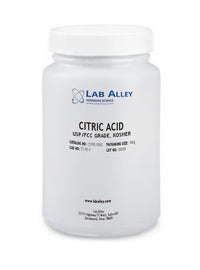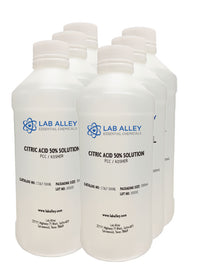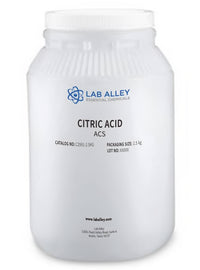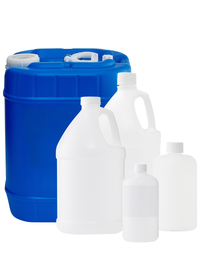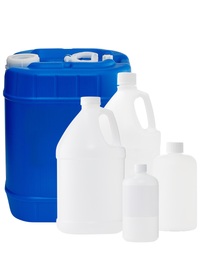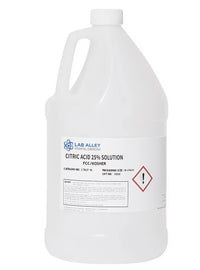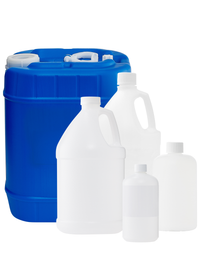Citric Acid
Powder And Solutions Used In The Food, Beverage, And Pharmaceutical Industries
About Citric Acid
Citric Acid is an a-hydroxy acid or polyprotic (AHA); it can also be classified as a b-hydroxy acid with a chemical formula C6H8O7. It is odorless, colorless, and sour in taste and appears as liquid and as a white crystalline solid. This Acid widely occurs in a variety of fruits and vegetables, especially in citrus fruits (lemon juice contains 7– 9 % of Citric Acid), and is responsible for their tart taste. From a biochemical point of view, Citric Acid is of tremendous importance, considering that in a series of enzymatic reactions (the Krebs cycle or tricarboxylic acid cycle), humans and animals produce Citric Acid to generate energy through the oxidization of fats, proteins, and carbohydrates.

Citric Acid is an organic compound listed by the Food and Drug Administration (FDA) and is generally considered safe (GRAS) as a food additive.
It is commercially produced in millions of tons with a steady annual increase in consumption and production.
Major uses and applications
Citric Acid is used in the food, beverage, and pharmaceutical industries; it is the active ingredient in: pesticide products, the manufacture of ecologically compatible detergents, chemical cleaning, metal cleaning, concrete admixtures, and plasticizers.
Citric Acid is reported to function in cosmetics as a chelating agent, pH adjuster, or fragrance ingredient; it is used in almost every category of cosmetic products; it is reported to be utilized at concentrations up to 39% in products diluted for (bath) use and up to 4% in leave-on products.
Food industry
Citric Acid is used in numerous consumer goods, in food and beverage industries. As an acidulant, it stimulates a natural fruit flavor in soft drinks and syrups and provides the desired degree of tartness. It stabilizes commercially prepared juices, frozen fruits, candies, canned vegetables, fish, and meat products. In wines and ciders, Citric Acid inhibits oxidation and browning, assuring their transparency. As an adjusting pH agent, Citric Acid is a constituent of jellies, jams, and gelatin desserts. In dairy products, its antioxidant, acidifying, and emulsifying properties are used to produce ice creams and cheeses.
Pharmaceutical and chemical industry
Being biodegradable and safe for both industry and consumers, it is also utilized in many pharmaceuticals. As an anticoagulant is used in the transportation and storage of blood plasma, cosmetics, and toiletries supplements.
Citric Acid has the ability to form complexes with almost every metal ion utilized to produce efficient soaps, laundry detergents, and household cleaners. Using this property, Citric Acid is frequently used in analytical chemistry as a buffer masking agent for various metal ions and an eluting agent in ion exchange chromatography.
Citric Acid is applied in a broad range of applications, as a cleaner of steam or hot water systems to remove calcium layers, in electroplating, copper plating, metal cleaning, leather tanning, in the production of photographic reagents and inks, in construction (additives to cement), in a solution of fouling problems, paper, printing and textile industries.
Common Uses and Applications
- Antioxidant
- Cleaning agent
- Emulsifying agent in ice creams
- Additive of sour taste to soft drinks and other food items
- Active ingredient of shampoo
- Sucrose crystallization in caramel
- Food coloring
- Natural preservative
- It removes the chalky deposit from evaporators, kettles, and boilers.
Industries
- Food And Beverage
- Pharmaceutical
- Cosmetic
- Cleaning and detergent
- Textile
- Photography and ink
- Metal and cement
- Paper and printing
- Chemical


